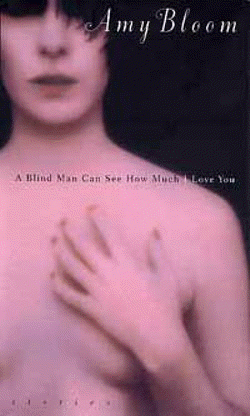
Away
Amy Bloom
Barbara Rosenblatt,
Reader
(HighBridge Audio)

Lillian Leyb has been run out of Turov by yet another pogrom, villagers turned against the Jews. She sees her mother, father, and husband massacred, is barely able to get her daughter Sophie hidden away in the chicken-coop before she has to escape.We meet her a short time later, in Brooklyn, in 1924, age twenty-two, waiting in line to be interviewed by Mr. Reuben Burstein, owner of the Goldfadn and Bartlestone Theatres. Lillian is living with her cousin, needs money, and a job. Reuben Burstein says he needs a seamstress. and soon Lillian will have job, serving the needs of Mr. Burstein.
She thought the man that would come along with the new apartment would be Meyer, the beautiful actor, the owner's son. Not so. He prefers young men: "This is what it is to be this way," we are told: "desire rises in you like a fountain of champagne, your blood is bubbling, and you're trying to smooth a place on the dirt so the gravel will not tear the knees of your green suit."
§ § § Meyer and Reuben are just the beginning of a series of adventures for Lillian, setting off, around the world, to reclaim her daughter. There's Chicago and points west on a train, a Seattle whorehouse with a lady named Gumdrop: "She watches Gumdrop rapping her smart little orange shoes against the linoleum and sees what Gumdrop sees: a lumpy-headed white woman with very few skills, no money, and not much promise."
It is this seeing (and being seen) that endears us to the author; that and her ability to take Lillian to the brink of death, lets her survive a dozen times, in Russia, across America, in the Hazelton Agrarian Work Center for Women in British Columbia, culminating in a ridiculous trek across Alaska on her way to the Bering Straits.
Lillian, marching through the snow, alone, cold, with blisters, "and these blisters take as much of her attention as the wild animals, the staggering physical beauty,"
For the rest of her life when she closes her eyes, she finds only three images of all the thousand she intended to keep: a line of low purple flowers, sparse and underfed, sprinkled among the fallen trees; green light rippling noisily across the night sky; a pink coral-streaked dawn near Tagish.
"The purple flowers of the Alaskan wild, sparse and underfed."
We first found Away in a HighBridge audio edition narrated by Barbara Rosenblatt. I can't tell you how much fun it was, day after day --- I only get to hear it on the commute --- listening to Lillian's exuberant high adventure in a nearly perfect rendering. The men sound like men, the women like women, and, meanwhile, there are the perfect intonations of 1920s Brooklyn Yiddish life, including Yaakov Shimmelman ("Tailor, Actor, Playwright ... Pants pressed and altered").
When she laughs at his calling-card, he admonishes her, then says, "I was just teasing you, ketzele. Of course it's funny. It's true, it's absolutely tragic --- and, he adds, in English, 'abso-tive-ly, pos-a-lootly' --- but that does not make it any less funny. For people, like us,"
and he looks at her closely, to see if she is people like him, and he seems satisfied, "that makes it even a little bit funnier."
One critic called Away a "Moll Flanders on-the-road novel," but it's more interesting than Defoe (or even Kerouac). Bloom is a first-rate story-teller, so good that you don't want her to get on with it, even when, at last, Lillian finds (and almost loses) the love of her (and our) life.
--- Lolita Lark